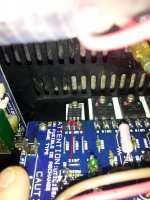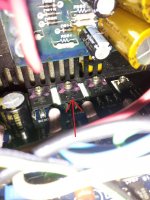You wont get a reading from them unless they are dead.
They usually go short from D-S and sometimes gate to D or S.
Test them all for shorts.
They usually go short from D-S and sometimes gate to D or S.
Test them all for shorts.
All of them but those two I am getting readings. I checked and rechecked just to make sure. It is my fault too. I recapped the amp and had two wires switches. Left channel works fine and the right blows fuses. I have been checking the values to everything on the board.
A lot depends on what damage the swapped wires caused.
Sometimes just replacing damaged mosfets works and other times they just blow again if you havent fixed all the faults on previous stages.
If it is blowing fuses then it sounds like blown mosfets. The only other thing capable of blowing fuses is a power supply fault.
Sometimes just replacing damaged mosfets works and other times they just blow again if you havent fixed all the faults on previous stages.
If it is blowing fuses then it sounds like blown mosfets. The only other thing capable of blowing fuses is a power supply fault.
The power supply is good as the other channel is working fine. I did some reading and you confirmed it that a dead mosfet will cause the fuses to blow.
Now, can I just order one of each or is it a good idea to replace all of them?
Now, can I just order one of each or is it a good idea to replace all of them?
Now, can I just order one of each or is it a good idea to replace all of them?
I would just replace the dead ones. So long as the others dont have shorts they should be ok.
Thanks for your assistance. I'm a novice, but learning real fast and I find it very interesting. I recapped my rotel pre and wow it sounds so much better.
Thats what I will do. Thanks again.
It should fix it.
I usually find blown mosfets are all that is wrong.
I dont want to get too technical but sometimes something else can be taken out to further back in the circuit with the mosfets
If i replace the mosfets and they blow again I take out all the mosfets and wire the VAS output back into the ltp and this closes the loop for testing the amplifier. I can then check for dc bias and offset.
I wouldn't just replace those ones that are fried. They need to be matched- all of them. If you replace only the ones that are fried with diff production date ones, chances are that you will be sacrificing reliability. Also from experience, always desolder Mosfets when testing. For some reason they can test no-short when in circuit. Maybe someone can tell me why?
Check also all drivers. Some times all drivers are catastrophically destroyed when the power mosfet gets shortcicuited from drain to gate, more in case of high drain voltages. Is case of routine at my job repairing speed drives for AC motors.
Im going to desolder them tonight and test. It sounds like a good place to start and I will probably order 8 new mosfets tonight. I ordered 2 yesterday, but was wondering about the matched issue. Im glad someone mentioned it. In the least, I will have two spares. Unfortunatly it takes forever to ship from china.
I replaced the suspected transistor, set the bias and the amp fired up. It does run hotter than normal, but sounds fine. I think I understand why they have to be replaced in series now. I think I am going to buy 12 matched from ebay. What is the tolorance to make them "matched"? Is 50mv alright?
Do they need to be matched ?
The bias (quiescent current in FET's) will determine how hot it runs. Have you followed a specific manufacturer procedure to reset it. Is the bias stable with temperature ? Have you rechecked and reset the bias when the amp is really hot ?
The bias (quiescent current in FET's) will determine how hot it runs. Have you followed a specific manufacturer procedure to reset it. Is the bias stable with temperature ? Have you rechecked and reset the bias when the amp is really hot ?
I think it's mostly unnecessary to match all transistors.
My advice: Make sure that the complementary types are from the same manufacturer.
My advice: Make sure that the complementary types are from the same manufacturer.
Replace all of them. Make sure the batch numbers on them match!! If the unit has source resistors, make sure they are matched too. Once everything is soldered in. measure across source resistors. They should all give the same voltage reading. If they are not, move mosfets around a bit to mix 'n match!!
- Status
- Not open for further replies.
- Home
- Amplifiers
- Solid State
- Mosfet Transistor question

